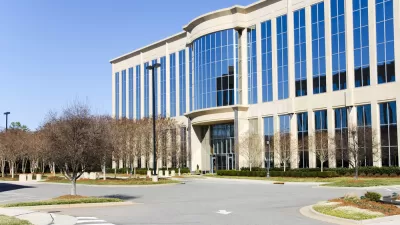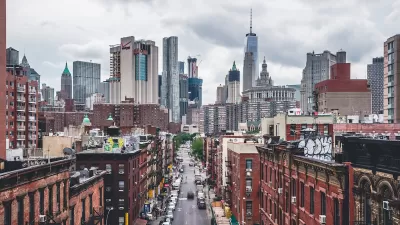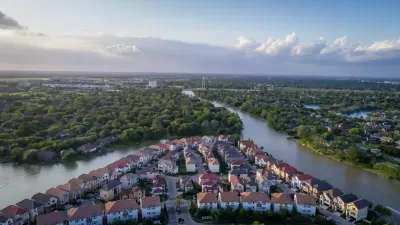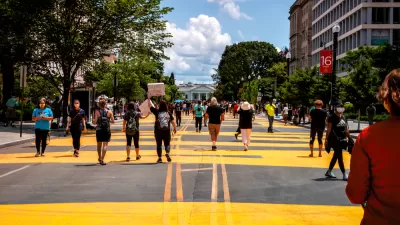Suburban office parks are achieving the status of ghost towns in the Washington, D.C. area.

"There are 71.5 million square feet of vacant office space in the Washington region, much of it piled in office parks. That’s enough emptiness to fill the Mall four times over, with just enough left to fill most of the Pentagon, the granddaddy of office buildings," reports Dan Zak.
Zak adds: "If office space was a commodity, we would make a killing by selling our excess in bulk to San Francisco, where it’s so scarce and costly, according to Quartz, that start-up employees are starting to work in shopping malls."
The article is an in-depth look at the suburban office park, with anecdotes of specific examples of vacant office buildings from the Washington D.C. described in colorful detail as modern ghost towns. The article also goes way, way back in tracing the roots of the suburban office park—all the way back to Thomas Jefferson's writings about the American distrust of cities.
The trends in suburban office parks also run counter to the more common narratives about the Washington D.C. area: of a rapidly gentrifying urban core, of expanding transit system, and of worsening car commutes. Rather, according to Zak: "Factor in the D.C. region’s net outward migration, its slowing growth rate and the government erosion wrought by sequestration, and you’ve got a problem.The office-market artery of Interstate 270 is shriveling, according to a June report prepared for the Montgomery County Planning Department. Last year, federal agencies vacated 7,315 buildings, abandoning 47 million square feet of office and warehouse space, Federal News Radio says."
FULL STORY: The old suburban office park is the new American ghost town

Planetizen Federal Action Tracker
A weekly monitor of how Trump’s orders and actions are impacting planners and planning in America.

Maui's Vacation Rental Debate Turns Ugly
Verbal attacks, misinformation campaigns and fistfights plague a high-stakes debate to convert thousands of vacation rentals into long-term housing.

Restaurant Patios Were a Pandemic Win — Why Were They so Hard to Keep?
Social distancing requirements and changes in travel patterns prompted cities to pilot new uses for street and sidewalk space. Then it got complicated.

Charlottesville Temporarily Has No Zoning Code
A judge ordered the Virginia city to throw out its newly revised zoning code, leaving permitting for new development in legal limbo.

In California Battle of Housing vs. Environment, Housing Just Won
A new state law significantly limits the power of CEQA, an environmental review law that served as a powerful tool for blocking new development.

Boulder Eliminates Parking Minimums Citywide
Officials estimate the cost of building a single underground parking space at up to $100,000.
Urban Design for Planners 1: Software Tools
This six-course series explores essential urban design concepts using open source software and equips planners with the tools they need to participate fully in the urban design process.
Planning for Universal Design
Learn the tools for implementing Universal Design in planning regulations.
Heyer Gruel & Associates PA
JM Goldson LLC
Custer County Colorado
City of Camden Redevelopment Agency
City of Astoria
Transportation Research & Education Center (TREC) at Portland State University
Jefferson Parish Government
Camden Redevelopment Agency
City of Claremont





























